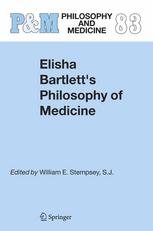

Most ebook files are in PDF format, so you can easily read them using various software such as Foxit Reader or directly on the Google Chrome browser.
Some ebook files are released by publishers in other formats such as .awz, .mobi, .epub, .fb2, etc. You may need to install specific software to read these formats on mobile/PC, such as Calibre.
Please read the tutorial at this link: https://ebookbell.com/faq
We offer FREE conversion to the popular formats you request; however, this may take some time. Therefore, right after payment, please email us, and we will try to provide the service as quickly as possible.
For some exceptional file formats or broken links (if any), please refrain from opening any disputes. Instead, email us first, and we will try to assist within a maximum of 6 hours.
EbookBell Team

4.4
52 reviewsThis volume is a scholar's edition of the first systematic American work on the philosophy of medicine, An Essay on the Philosophy of Medical Science (Philadelphia, 1844), by Elisha Bartlett (1804-1855). The book is divided into two parts: Part I consists of a critical introduction that gives a biographical sketch of Elisha Bartlett and situates his empiricist philosophy of medicine within the philosophical debates of the various theoretical schools of medical practice of early nineteenth-century America. Short summaries of Bartlett's other writings and important addresses are presented, and many of the reviews of Bartlett's work that appeared in the medical journals of his time are discussed. Also, the influence of the Paris clinical school on Bartlett's philosophy is shown. Part II contains the Essay, and includes a previously unpublished manuscript of Bartlett's philosophy of therapeutics, which develops some of the ideas of the Essay and adds another facet to Bartlett's philosophy of medicine. In conclusion, some critical notes on Bartlett's works are incorporated. A bibliography includes Bartlett's published work, published reviews of his work, unpublished manuscripts and correspondence, and secondary literature on Bartlett and the philosophy of nineteenth-century medicine, and the book's index provides scholars access to the major ideas in Bartlett's work.
This book will be of interest to philosophers of medicine, physicians, historians of medicine, and medical ethicists.